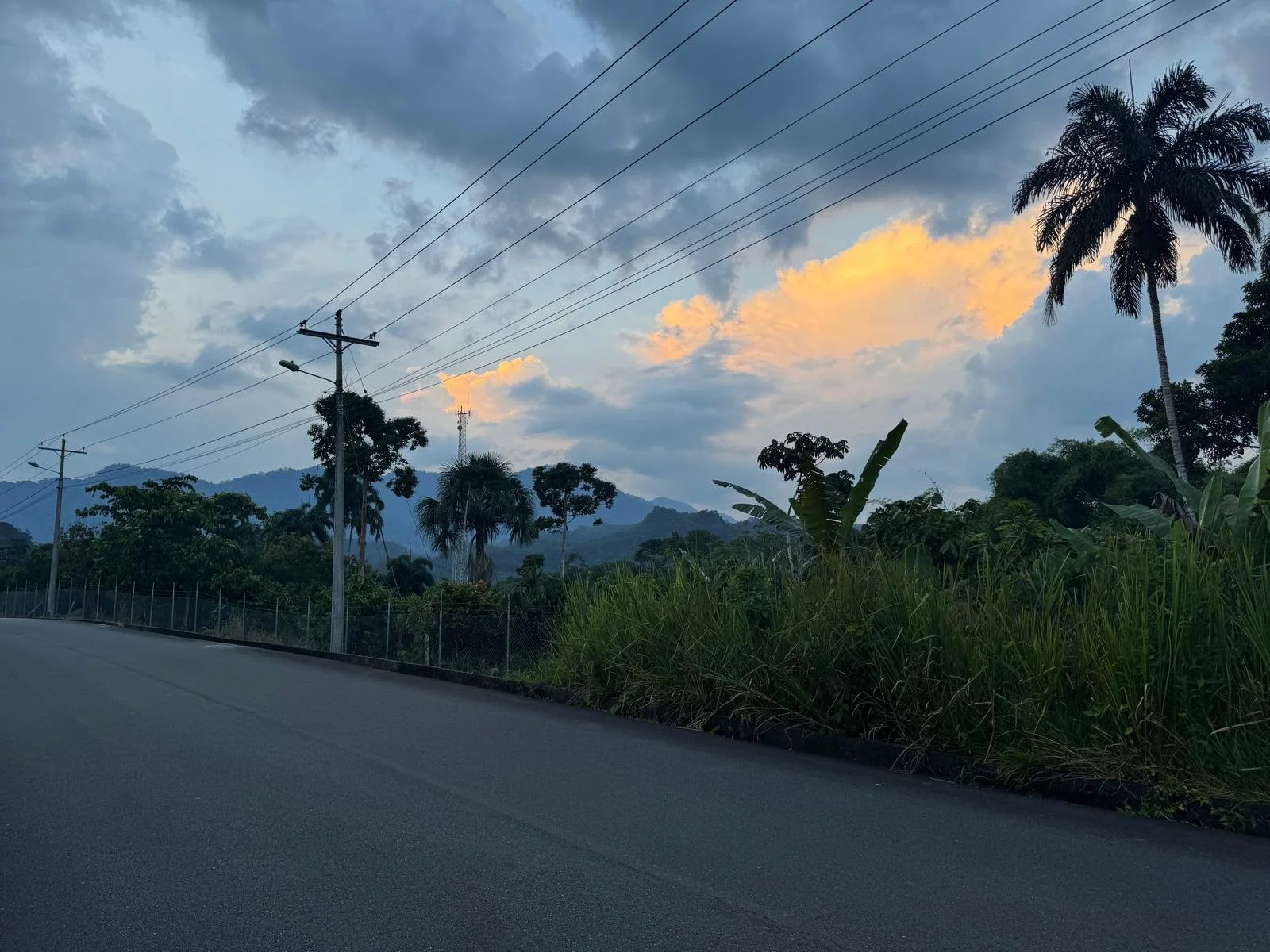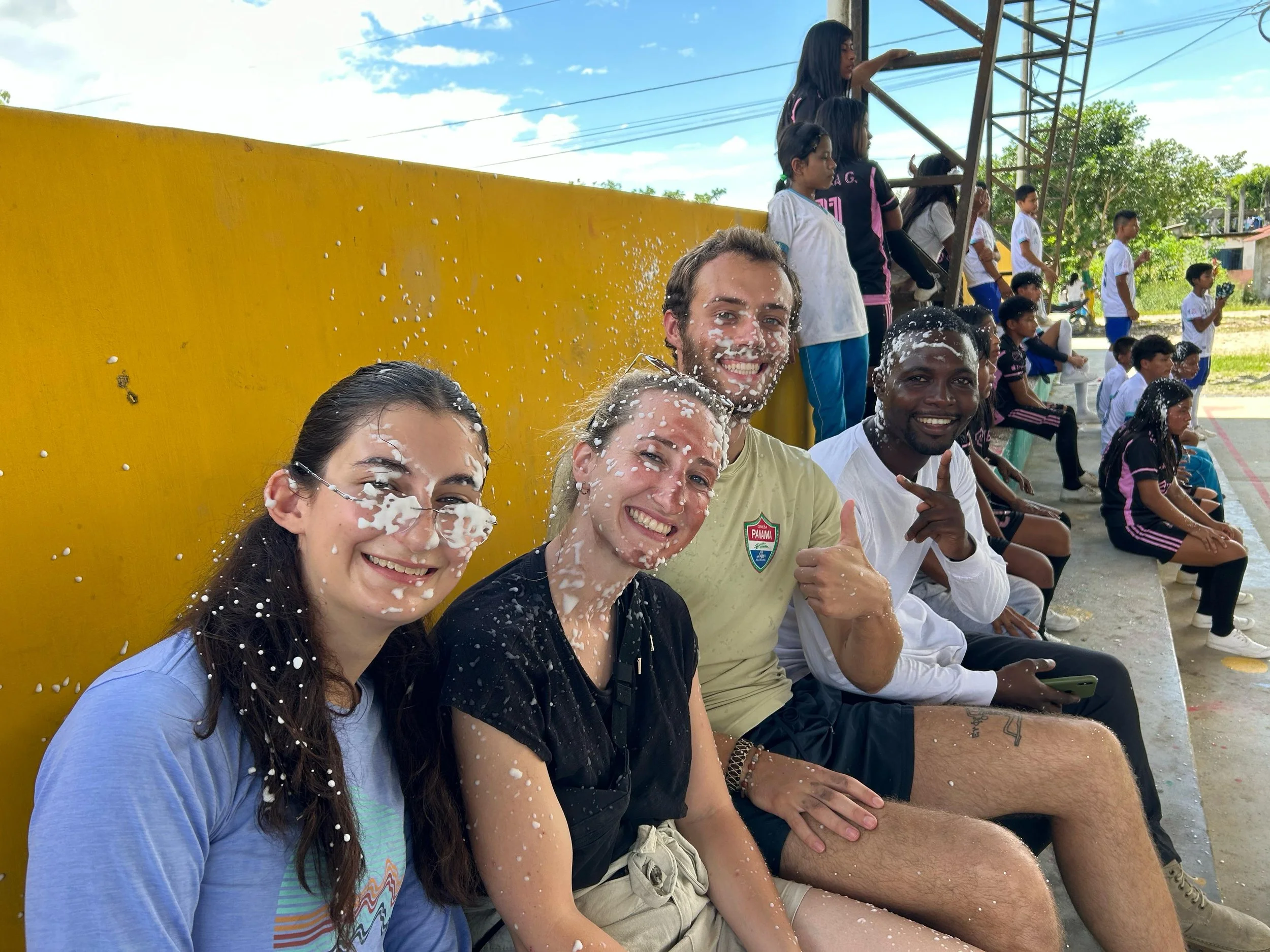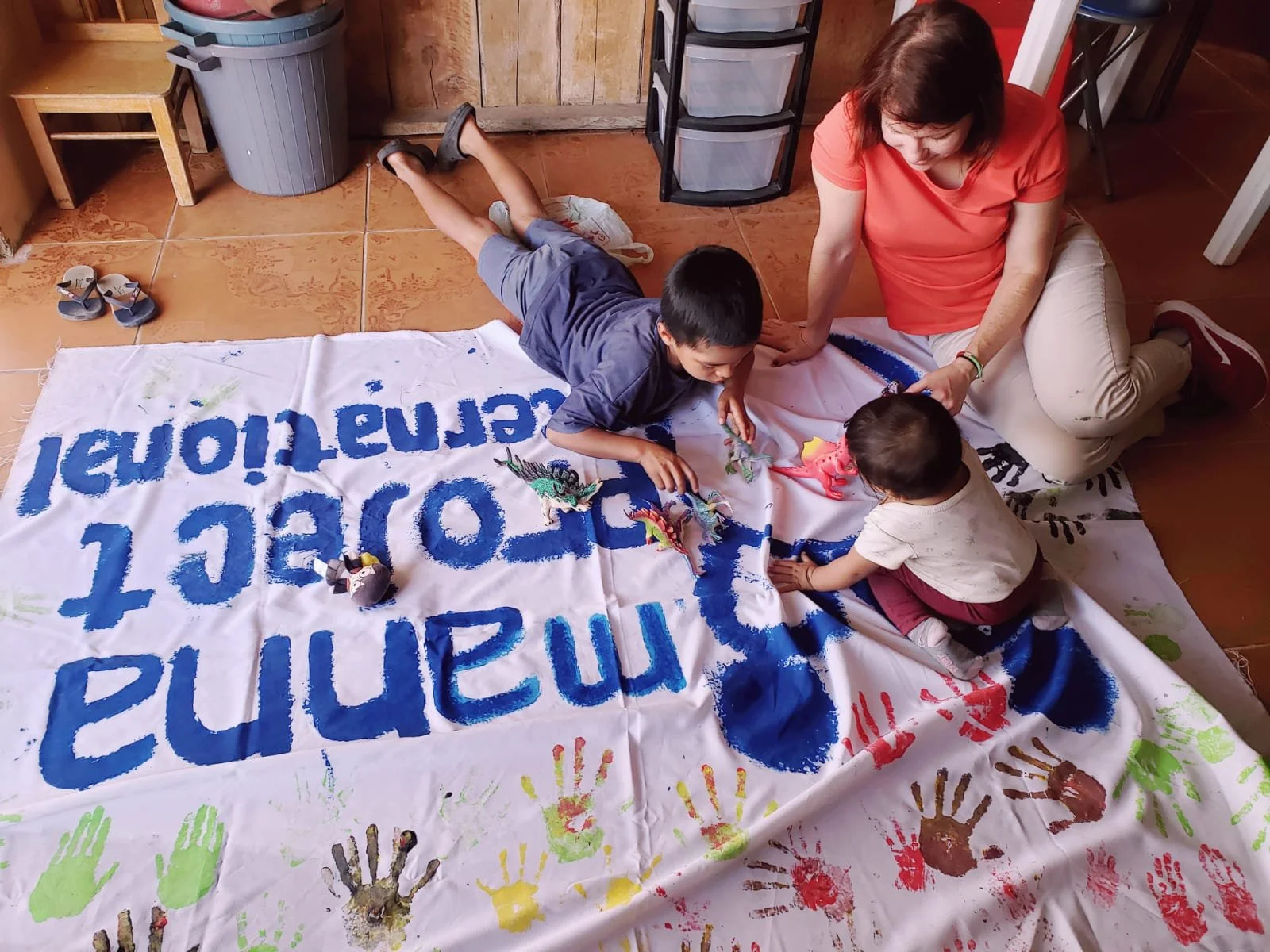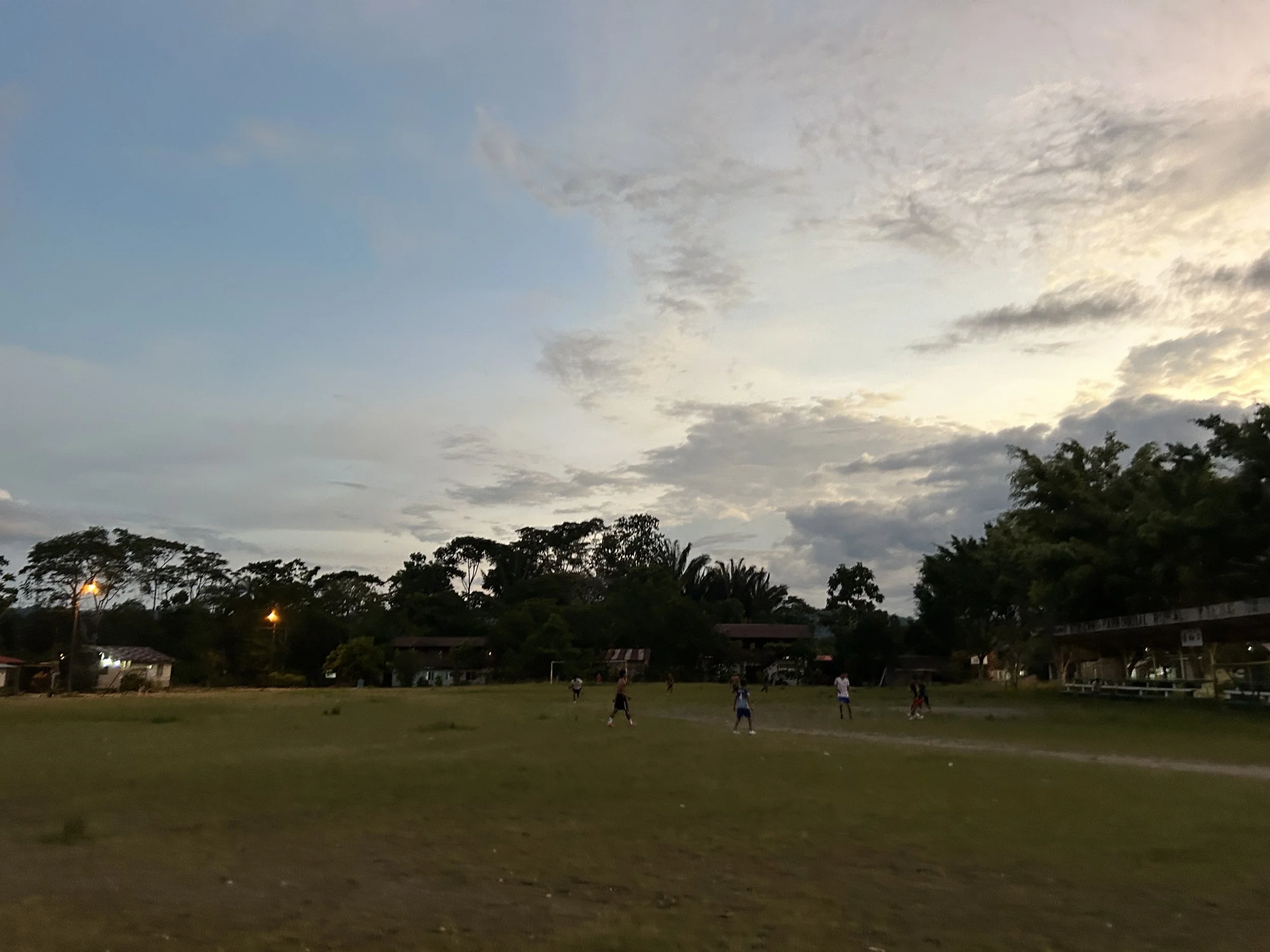A gap year intern shares how sports helped them build community, improve Spanish, and create meaningful connections while living and working in Ecuador.
What Protests and Community Taught Me in the Amazon
By: Gabe Nichols, Carleton Extern ‘24
Over the past two weeks that I’ve spent here in the community of Shandia, I’ve learned so much and become more conscious of specific aspects of life that are both common and uncommon to my past experiences living in the United States. I came to volunteer for Manna Project International as a youth development extern and almost immediately encountered challenges that have helped shape my awareness of the problems people face in Ecuador and worldwide. Importantly, while being here I have also encountered many positive aspects present in the community of Shandia which are desperately needed elsewhere and should be followed.
As a youth development extern, my role involved working with the children in Shandia and also originally involved shadowing the youth development program director as he worked in the local school. However, for most of my first week in the community, the students were taking exams so I was unable to sit in on their English classes. While disappointing, I didn’t think this would be a problem because classes would resume the following week. However, as my first week in the community was coming to an end, organized protests broke out within the province over plans to build a maximum security prison in the town of Archidona near Tena. As a result, travel within the region, even between Tena and Shandia became extremely difficult because of man-made roadblocks that had been formed in protest of these plans. Owing to this, school was canceled and did not resume the following week because teachers were unable to travel to work and people across various industries had chosen to go on strike.
I had hoped to be able to witness the process of teaching English at the school in Shandia, yet these unforeseen circumstances weren’t completely negative. These events helped strengthen views I already possessed before coming to Ecuador and led me to realizations that I hadn’t previously reached. As a political science major, the events surrounding the protests against the planned prison construction in Archidona have been fascinating to me, and I was extremely impressed by the rapid coordination it must have taken to organize all of the people who took part in the protests around in the province and created roadblocks in such a short amount of time. Mobilizing the various groups involved in this political action only a few days after possessing widespread knowledge of these plans would have been no small undertaking. Especially after coming to the community of Shandia, I realized the importance of community and the friendliness present within indigenous Kichwa culture. When passing on a street, meeting in a home, or just going about one’s day in the community everyone’s presence is acknowledged, and it is expected that you shake hands and greet anyone you cross paths with. This consciousness of the importance of community and the accompanying close social bonds that come with it I’m certain had to have played a large part in the successful mobilization seen within the protests here.
While it remains unseen if the protests will be successful in preventing this construction, seeing the lived experience of people here has firmly made me believe that the emphasis on community and the acknowledgment of all within a community occurring in Shandia are cultural practices that should be adopted elsewhere and are badly needed in the United States. In my view, these seem to be actions almost essential for greater human flourishing to exist in the world. These recent events have also made me continue to recognize the importance of realizing an education that is accessible to all, as well as the challenges to this realization. Particularly in rural areas in Ecuador and the world, accessing education can become very difficult since the resources present in more isolated areas are slim. Additionally, in rural areas like Shandia, some teachers do not live directly in the community. When it is difficult to travel to an area where one teaches (such is the case with the roadblocks) the educational access of an entire community is diminished. Living in Shandia during this school cancellation has made me better understand the challenges children face in accessing education in rural areas especially due to their remoteness. While these events sound like a mixed bag, they have also made me better appreciate the work Manna Project does for children in the community through after-school programs such as the art program. Despite the cancellation of school, children were able to receive free educational lessons through this program while also being able to express themselves creatively.
I’ve found no easy way to sum up my experience externing for Manna Project that fully captures everything that I’ve learned from living here in Shandia (which explains why I’m kinda rambling in this blog post), but I do have a few key takeaways. Over the past two weeks, I’ve encountered cultural practices that I believe to be essential for people to live harmoniously and with dignity, I’ve grown to better understand struggles related to education accessibility and I’ve been afforded the opportunity to see the important work Manna does for the children of Shandia. Externing here instead of going to some dusty office in the United States is not something I will easily forget and I am very grateful I was privileged enough to come and learn from Manna Project International and the community of Shandia.
Building Trails & Connections in Shandia
By: Liam Atkins
Coming to Ecuador I knew I would love working on eco trails. I have plenty of past experience working on trail maintenance and construction, mostly from volunteering to build mountain biking trails in my home state Colorado. I didn’t know what to expect coming to Ecuador to work on trails, if anything I expected it to be similar to working back in Colorado. I was entirely incorrect. Trail in Spanish is sendero, but sendero has a different meaning in Ecuador. Some work on a sendero involved what I thought it would, digging and moving dirt to build new trails, but a lot of work on the sendero was helping create lodges and trail systems where tourists would stay.
Much of this work involved collecting materials such as water and sand for concrete or rocks to create a path. What was especially rewarding about this work is how appreciative the owners of the sendero were. What was seemingly simple work went a long way and even spending just 1 or 2 hours helping collect materials made a difference in progress for the overall project. The owners even went as far as to make us lunch and repeatedly asked us to come back and work more when we had free time. I felt like the locals appreciated my work and wanted me to keep coming back to help more.
Working on the sendero also gave me a chance to practice my Spanish. As a Spanish beginner, being thrown into a workplace where I am forced to speak and understand the language was daunting. But the other workers were very understanding and I was able to strike up a basic, but meaningful, conversation where I learned about the locals hopes for the sendero as well as stories about living in Shandia and Ecuador as a whole. The language barrier between me and the rest of Shandia was something I was worried about but people were incredibly understand about my limited speaking abilities and some even wanted to practice their English with me as I practiced my own Spanish.
How kind and welcoming the people in Shandia are has been the most rewarding part of my time here in Ecuador. From the kids always saying hello and asking me to go hang out with them to everyone I worked with as a sustainability external being friendly and thankful for my help, spending time in Shandia and working with the community has been one of the most rewarding experiences I’ve ever had. I was nervous traveling to Shandia, not speaking much Spanish and unsure of what my time would be like, but after the first day of my time here, where I was invited to play equivolley in the town center, I felt like I was at home in the community and knew that my time here would be great. Day after day I met more and more lovely people, either spending time in the community or working on the senderos, and I am happy to leave knowing I helped progress a few projects and made countless friends here in Shandia.
Interested in working on senderos in the Amazon? Check out our short term volunteer options here.
Mining and the Amazon: The Economic and Environmental Impact in Ecuador
By: Ivana Lakov, Virtual Intern ‘25
Spanning 6.7 million square kilometres and accounting for over a third of tropical rainforests, the Amazon rainforest truly is an ecological wonder. The forest hosts 10% of all known wildlife species and over 20% of known plants, with a new species being discovered approximately every other day. Ecuador alone, despite containing only 1-2% of the Amazon, hosts about a fifth of the different plant species found in the total rainforest!
It’s no surprise that the Amazon rainforest is the major source of life for everyone around it, including people. Much of the diverse flora found in the rainforest is a cornerstone of natural medicine, and many native plants are harvested in the wild or grown in farms. With as much as a third of Ecuadorians working in the agriculture sector, agroforestry (and other kinds of sustainable farming) is often the backbone of local economies. The Amazon is also a major contributor to ecotourism, which provides seasonal revenue for locals and gives visitors the opportunity to experience the Amazon in a low-impact way.
Unfortunately, everything the Amazon rainforest sustains - nature, people, and most of all the local economy - is under threat. In recent years, mining, both legal and not, has caused more than 1.4 million hectares of deforestation throughout the Amazon, much of it taking place in indigenous lands. Traditionally, mining has mostly been an issue in the Brazilian part of the rainforest, causing up to 10% of total deforestation; in recent years, it’s spread to other parts of the Amazon, including Ecuador.
Mining, particularly illegal mining, has the potential to destroy the Amazon, with effects that extend far beyond the extraction site. Air pollution is common, as well as contamination of land and water. These effects - combined with the deforestation inevitably accompanying mining sites - mean devastation for the local economy. Extensive contamination means that people can no longer rely on the Amazon’s biological resources for any kind of work. Mining can severely limit farming possibilities, as pollution, loss of biodiversity, and depletion of viable land all make for a much more difficult environment. These effects also ruin any ecotourism opportunities in affected areas through its destruction of the natural environment.
Altogether, these consequences have derailed the economies of countless Ecuadorian communities, forcing many people to look for other sources of profit. It’s often necessary for people to join environmentally destructive industries such as petroleum extraction, monocultural farming, or mining itself. These industries, in turn, continue the cycle of damaging economies elsewhere, causing even more destruction to the environment, livelihoods- and also local culture.
Alongside flora and fauna, the Amazon is home to 1.5 million indigenous people and nearly 400 groups across the nine countries it covers. This includes over 300,000 indigenous people in Ecuador, made up of 14 nationalities and more than 20 languages.
The Amazon has always been intrinsically linked to Ecuadorian culture and traditional practices. For example, chakras, a type of small-scale farm, are traditionally used by Ecuador’s Kichwa people and contribute to general agroforestry methods in the Amazon. Chakras promote biodiversity and allow for economic freedom for locals, as their owners can make a profit selling crops. Foods grown on these farms, like yucca and plantains, are staples, in addition to wildlife used in hunting and fishing. But because of pollution and shrinking ecosystems, Indigenous societies are in decline. Mining and deforestation are some of the biggest threats to these traditional lifestyles.
Luckily, Manna Project is facing these problems head-on. Beginning in January 2025, the RAÍZ (Regeneración Agrícola e Innovación en Zonas Rurales) program aims to support the Amazonian Shandia community through environmental preservation and sustainable agricultural practices, both traditional and modern. The program’s initiatives are implemented through hands-on trainings and workshops, with goals like crop diversification and climate resilience.
Volunteer work on chakras is another significant aspect of Manna Project’s work in the Shandia community, tying into RAÍZ’s ambitions of sustainable economic opportunity within Ecuadorian villages. In 2025, RAÍZ will include 30 farmers - impacting up to 150 people - in its program, while chakra work and other programs are ongoing. Other projects help preserve ecotourism in Shandia through trail maintenance and restoration.
There is no denying that Ecuador faces a difficult task in reclaiming its local economies from harmful industry. But Manna Project International’s initiatives - through their development of environmentally responsible self-sufficiency - can make the challenge that much less daunting.






